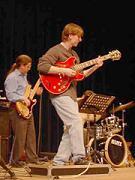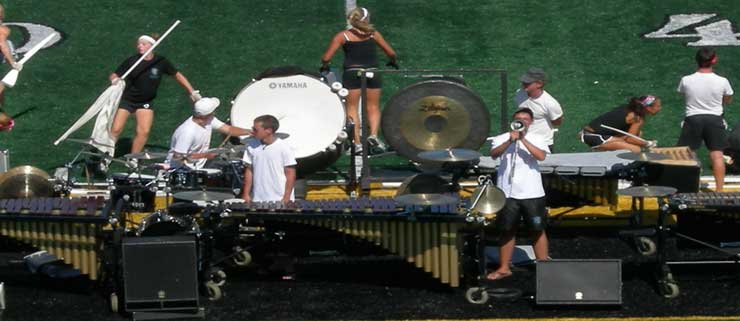 Twin cities guitarist and teacher Mike Krajewski has been trained at some of the best schools in the country. Having completed performance degrees from the Berklee School of Music in Boston and Georgia State University, Mike has decided to go back to school to complete his DMA in classical guitar performance from the University of Minnesota. Aside from being a full-time student, and active performer, Mike is also on faculty at the McNally Smith College of Music in St. Paul.
Twin cities guitarist and teacher Mike Krajewski has been trained at some of the best schools in the country. Having completed performance degrees from the Berklee School of Music in Boston and Georgia State University, Mike has decided to go back to school to complete his DMA in classical guitar performance from the University of Minnesota. Aside from being a full-time student, and active performer, Mike is also on faculty at the McNally Smith College of Music in St. Paul.
Mike took time off from teaching at McNally Smith and working on his Doctoral studies to talk to us about his approach to teaching and working with students of all ages.
MW: How did you get your start as a guitar teacher?
MK: I started when I was still in High School. The Health teacher had a son who wanted to learn guitar - he was my first student. From there word got around that I taught guitar and I managed to have 5 students my senior year of high school. At that time I was working on the fundamentals myself so it made me think about how I was going to learn and teach material.
For the most part I was still “self taught†in my own development. I had a few lessons, but from really BAD teachers. After taking lessons from a few bad teachers I promised myself that if I were ever to teach guitar, I would not be like them! Many times you learn what not to do as well as what to do. From that point on I have always taught lessons, which was 18 years ago.
MW: Did any of your teachers have an influence on your private teaching approach?
MK: I would have to say that my biggest influence on my private teaching has been John Sutherland, Guitar Professor at the University of Georgia. I began taking private lessons with John about 4 years ago. He is one of the best teachers you will find anywhere. His main discipline is classical guitar. He really makes you think about musicality, technique, phrasing, articulation, etc. His ability to break everything down and give you precise ways of working on these elements is amazing. Plus, he is one of the most beautiful human beings I know.
There have been a few teachers along the way that have guided and directed my approach to teaching. Some of my teachers at Berklee College of Music, Jon Finn, Mark French and Jim Kelly and at GeorgiaState University: Kevin Bales, and David Frackenphol.
I feel very fortunate to be working with Jeffery Van at the University of Minnesota right now as I pursue a DMA in Guitar Performance. He is a wonderful teacher and has performed not only a wealth of solo material, but chamber music and is an experienced composer as well. I have only been working with Jeff for about a year but I can already tell he is going to have a major impact on my teaching and playing.
MW: As someone who draws from many influences in their playing how do you encourage students to explore different genres and styles of music?
MK: Absolutely! I try to set an example by playing many styles and knowing as much about various styles as I can. As an educator I feel it is my job to introduce students to musicians and styles.
Since the guitar is prevalent in many genres of music it is important for us not to be close minded. I think we can learn something from many different styles of music. At McNally Smith College of Music, where I teach full time in the guitar department, I have students who are into many different styles. They are checking out players from Wes to Jimmy, Herring to Guthrie Govan to Brent Mason and Brad Paisley. Â The nice thing is that they are always searching for new people to listen to. Not in any given style but players that play at a high level. I learn about new players through my students but also feel that it is my obligation to know about as many of these players as possible. I also encourage them to listen to other instruments.







 Scroll down to view the comparison chart of over a dozen different portable digital audio recorders.
Scroll down to view the comparison chart of over a dozen different portable digital audio recorders.